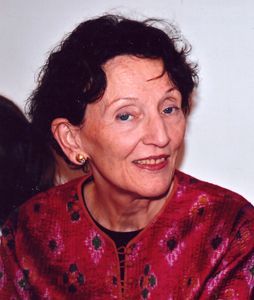 'A family works best when a husband and wife share a 15 to 20 per cent relationship.'
'A family works best when a husband and wife share a 15 to 20 per cent relationship.'
'Sex may not form the central part of a relationship, but to be able to spell out one's desires, even if they are not fulfilled, is what keeps couples together.'
Ursula Troescher-Huefner, the leading German psychotherapist, tells Rediff.com contributor Rashme Sehgal, 'It is important to understand how the soul of an individual works' in a fascinating interview.
What is systemic therapy?
Systemic therapy goes beyond merely looking at an individual patient who is showing some symptoms. It broadens, both for the therapist and also for the family or individual, the understanding of the family system and the meaning of the symptom a member of the family shows.
To explain in greater detail, a patient may come to me with symptoms of deep depression. This can be viewed as a problem of an individual or of his family of origin or his whole family system.
I attempt to make the patient become aware of how a symptom can be seen differently and that it has a hidden meaning for the present system.
I work on several levels: Historically, by looking for facts and by questioning the patterns of behaviour in crises situations of the parents.
The second level I work on is to help develop awareness that the patient uses similar patterns in solving problems in the present as the parents or even grandparents generation did.
In this sense, we 'inherit' patterns and use them until we start to suffer. Relationship patterns are constantly repeated in families.
How many generations do you go back when looking for information?
My charts of families, called 'Genograms,' go back several generations. I check at least the parents and grandparents generation to see if there are events that may influence the current patterns.
Do patients talk freely about their past?
When patients first come to me, they sometimes tell me that they are part of a harmonious family unit. However, behind this presented picture there is often a huge amount of anger, fury and brutality (verbal and physical), feelings which were taboo in a so-called harmonious system. It can be an emotionally frozen system.
They will insist they never faced a crisis and that their families never witnessed any untoward incident. The more they deny it, the more I look for facts and details about their family structures and families of origin.
For example, I check facts and may find out that when someone was born in their family, someone also died around the same time.
The unconscious connection to the present can be a feeling of guilt as if one can only live when another member dies. This may be expressed by a family member through a symptom.
The systemic view tries, by questioning, to open up different hidden trails that may help explain the present symptom in the system.
Looking at the situation in Germany from a historical perspective, we had two world wars in the last century. The experiences of the wars created existential fear which people often had to hide as they had to focus on physical survival.
In therapy we have to deal with the results of these hidden feelings even three generations after the Second World War. The war generation had learned to hide their feelings and avoid reflecting on the meaning of their experiences.
This pattern was passed down to their children who learned not to show certain feelings. It is often the case that sadness and fear are transformed into all forms of aggressive behaviour.
It is important to understand how the soul of an individual works. The influences come from many past generations as also from the present environment.
The soul is the seismograph of our identity.
People think they can solve problems intellectually, but feelings are more important to introduce change.
Change does not happen when you follow something up only with your thinking; the soul provides the direction of change and the steps to action.
That is what is meant by change.
This sounds very close to the Hindu theory of reincarnation.
I don't believe in reincarnation. I am very concrete and prefer to deal with the present.
Each child is born at a different time of a parent's life. Children react to the unsolved problems of their parents' and perhaps even grandparents' lives.
Children up to the age of eight years are very open. A new born is completely open and absorbs the acknowledged and unacknowledged feelings of his parents.
Let me cite the example of one of my patients. The man is in his fifties and works in a big company while his wife is ten years younger and has remained a housewife. They have two children who are still in school. The elder child is very good in his studies, but for some months now, he insists he is sick and does not want to go to school. I asked to meet the children along with the parents.
My hypothesis was that the older child developed feelings of strong anxiety because their mother wants to go back to work. The child felt there would be a fundamental change in the family nest. This child tried by developing and displaying this anxiety to keep the mother at home and so to prevent change.
Another important aspect for couples is that many of them lose their sense of partnership once the children arrive. Women sometimes become very domineering in their homes. Thus, an imbalance develops in the partnership: the man has the money (the hard factor) and the wife has the children (the soft factor).
To compensate for the imbalance, women sometimes unconsciously deny their husbands' wish for sex. By denying him sex, she is trying to achieve an unconscious equality with her husband.
But by doing so, she does not know that she is harming herself. Women are often not willing to have any open discussions on the subject of sex. They often do not talk about their desire for sex or how they want it.
Sex may not form the central part of a relationship, but to be able to spell out one's desires, even if they are not fulfilled, is what keeps couples together.
I think the ability to communicate desires is what keeps couples together and also the steps they take to fulfil desires.
A lot depends on the habits that couples develop. Even when you do not like the habits of your partner, but learn to accept them is a major step in accepting each other.
Though, of course, learning to negotiate desires and controversial wishes is not always easy.
It is also sometimes the case that only one partner wants change and the other resists out of a fear of change and wants to stick to the old pattern.
Let me give you an example. A married man came to me because the couple's therapy he had tried with his wife had failed because the wife did not see any reason for change.
So, I worked alone with this man and helped him to understand his present situation in the light of his childhood.
His father had left the family and moved to the UK when he was seven years of age. The boy never saw his father again and the contact was cut completely.
Parents tend to use their children as instruments in their conflict with their partner, to inflict hurt and basically misuse their kids to give vent to their feelings of anger.
In this case, the mother did not encourage her son to have contact with the father, and as a result, the son became estranged from his father.
During our sessions, I encouraged him to write an imaginary letter to his father at home and then bring it back to the session. The idea of this exercise is to allow people to come into contact with their suppressed emotions and thoughts.
Writing this letter allowed him to express his feelings and desire for renewed contact with his father.
Finally, he actually mailed the letter to his father. This act of dropping the letter in the mailbox and losing control of it thereafter is one important step in change.
On receiving the letter, his father's response was that he wanted to come to Germany to meet him.
One important insight for this man was that he had unconsciously repeated a pattern of his childhood (parents) by deciding on a wife who, in this aspect, was like his parents in her resistance to change. He communicated with her in a way that was a repetition of the rejection he had already experienced from his father.
 I have a lot of couples as patients who are going through a divorce, and it is surprising how few women know about their rights.
I have a lot of couples as patients who are going through a divorce, and it is surprising how few women know about their rights.
I tell my patients they must inform themselves about the laws around separation and divorce in order to understand the judicial consequences of divorce.
Ideally, it should be done before they get married. The more clearly the financial issues are settled in the beginning of the marriage, the better may be the chance for love.
What makes a good relationship in a marriage?
Too much togetherness does not work.
A family works best when a husband and wife share a 15 to 20 per cent relationship.
Anything above this figure reflects our ideals and romantic notions about marriage, and this leads to disappointment and crisis, and sometimes to divorce.
In therapy, we understand that the process of change is in accordance with the balance between the wish for change and the anxiety regarding change.
Illustration: Uttam Ghosh/Rediff.com










